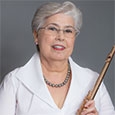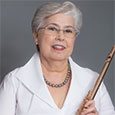While in high school as a student of Harold Bennett, I only had lessons every other week. Although he gave me a few etudes every week as well as exercises and much repertoire, I usually had the lesson pretty much ready by the end of the first week.
Of course, I continued to review and hopefully improve with the lesson, but then, what to do with my practice time? I would use it to practice orchestra excerpts, review pieces I had learned, and sometimes to try out new pieces I did not know.
Later, as a full-time professional flutist, if I had some extra practice time (which became more and more rare), I would use the time to go over etudes – both old and new. If there was more time, again I would practice orchestral excerpts (I played in the opera, but felt it important to keep them in shape) and start to look at new repertoire.
As the years went on, practice time became more precious, and I tried to make a point of warming up well every day – something I did not always have time for. My go-to warm-up is my vibrato exercise (which can be found in the NFA Pedagogy Book II) and Moyse’s Daily Studies A, B, C and D. It is sometimes difficult for young people to imagine trouble finding practice time, but I always encourage my students to practice now as they will surely have less time as they get older.
So, what if I was given the precious gift of an extra hour of practice time daily? Remembering that this is an extra hour, I would still begin with my regular practice routine. I think I would go back and play etudes – I love to play the Altés and JeanJean Etudes – they are so good for practicing so many things. What I would do most of all, however, is go through new music. By that, I mean new music to me as well as newly written music.
My music stands at home (and there are a few in my room) are covered with purchases from flute conventions. My music chests are stuffed to the gills with music. I know so much of it, and would like to learn so much more.
I would begin by reading through the music. If I liked the piece, then I would take some of this preciously gifted time and actually learn the new piece – perhaps to be programmed on an upcoming recital.
I know I will not like everything I try. There are pieces out there that I always enjoy listening to, and just do not find myself wanting to play. That is my personal taste, and not a reflection on anything other than that.
When I try a piece (or two) by a composer I have not known before, I usually want to find more by this composer and try those pieces as well. (I do the same with reading books.)
Assuming I find a piece I like, and it is with piano or other instruments, I would love to have the time to sit and study the score. I would like to know any passages that will be difficult to put together. More importantly, I want to know what others are doing and how it all fits together.
My wonderful students have made me aware of much repertoire that is new to me. I would like to learn more of what they have brought to me. I would like to refresh my technique with orchestral excerpts, some of which are quite difficult in so many different ways.
Sometimes, I am sure I would take that precious time and review pieces I love to play. What a wonderful opportunity to go back and play all of the Bach sonatas, the Gaubert pieces, the Handel sonatas (which I have so much fun ornamenting), and the Mozart concertos. Perhaps I would try again to write cadenzas for the Mozart G major concerto, something that has been eluding me.
I might use the time another way altogether and choose to learn more about music history. Famous and not so famous composers, the times they lived, and the art that surrounded them are all fascinating subjects. All of this will affect my interpretation of music and add to my enjoyment of the context of the music.
Time with some pedagogy books can be a wonderful asset. The two pedagogy books put out by the National Flute Association are chock full of wisdom. Ervin Monroe’s book on fingerings offers a mind-boggling amount of knowledge and advice.
My first instrument was the piano. Having the time to look at and (try to) play the accompaniments to pieces is a wonderfully valuable tool, and one I rarely have time for.
Most of all, though, I think I would take this precious gift and use the time – as I did in my teens – to just play and enjoy. This, most of all, is why I became a flutist.






